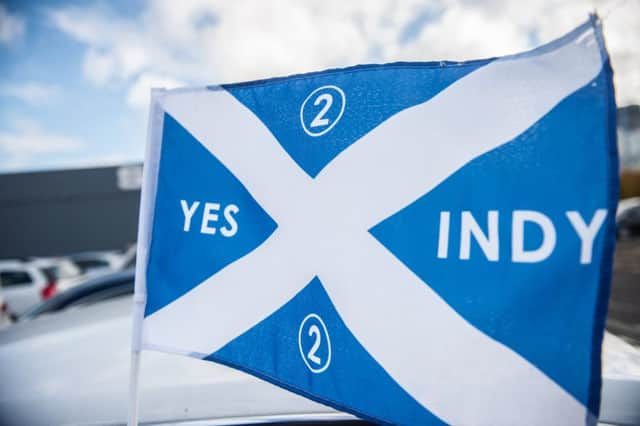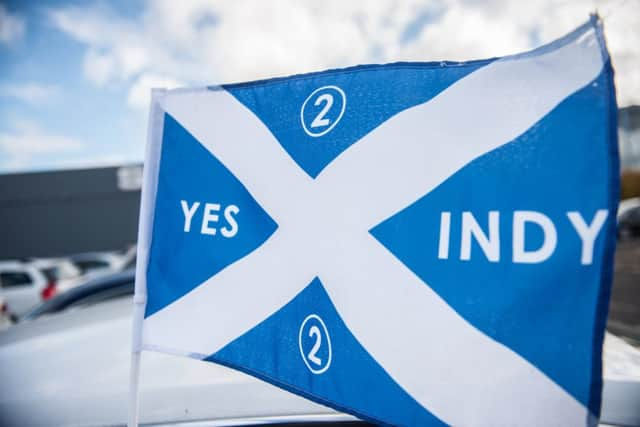Indyref2: Poll finds support for independence at high of 46%


Nicola Sturgeon’s drive for a second independence referendum is today boosted by the publication of ScotCen’s annual Social Attitudes Survey, which found that 46 per cent of Scottish voters now back independence.
Backing for breaking up the UK is now double the 23 per cent recorded in 2012 when the first independence campaign got under way – and one point above the result of that vote.
Advertisement
Hide AdAdvertisement
Hide AdThe findings suggest the future of the UK hangs in the balance as the First Minister attempted to take control over the timing of a second vote by insisting the Scottish Parliament should determine when it is held.
But the survey also identified rising Euroscepticism, which suggests it could be challenging for Ms Sturgeon to win support for independence by deploying her argument that it would enable Scotland to remain in the European Union. Even though Scotland voted to remain in the EU by 62 per cent to 38 per cent last year, ScotCen found that around two-thirds of Scots (67 per cent) either want Britain to leave the EU (25 per cent) or for the bloc’s powers to be reduced (42 per cent).
The proportion of Scots who can be considered eurosceptic has risen since 2014 when 53 per cent either wanted Britain to leave or have a reduction in the EU’s influence.
The rise in anti-EU sentiment came to light as Scotland’s relationship with Europe emerged as a key issue in the indyref2 battleground.
The Spanish foreign minister Alfonso Dastis suggested an independent Scotland would be unable to stay in the EU when the rest of the UK leaves. Mr Dastis said that Scotland “can’t just stay in the EU” and would be “at the back of the queue”.


Meanwhile, the SNP’s opponents claimed Ms Sturgeon’s case for independence was coming unstuck after Scottish Government ministers declined to spell out whether an independent Scotland would seek membership of the EU.
ScotCen’s findings – the latest in a series dating from 1999 – were based on a representative random probability sample of 1,237 people interviewed face-to-face between July and December last year. Edinburgh-based ScotCen is a key part of NatCen Social Research, Britain’s leading centre for independent social research.
The survey found that 46 per cent of the sample backed independence compared with 42 per cent who favoured devolution and 8 per cent who were against a Scottish Parliament. Support for independence was highest among the young, with 72 per cent of those aged between 16 and 24 believing the UK should be broken up.
Advertisement
Hide AdAdvertisement
Hide AdProfessor John Curtice, a senior research fellow at ScotCen, said: “The Nationalist movement in Scotland has never been stronger electorally. Meanwhile, from its perspective, the outcome of the EU referendum appeared to be a perfect illustration of their argument that for so long as it stays in the UK, Scotland is always at risk of having its ‘democratic will’ overturned by England.


“However, the commitment to the EU of many of those who voted to Remain does not appear to be strong enough that they are likely to be persuaded by the outcome of the EU referendum to change their preference for staying in the UK. There is a risk that linking independence closely to the idea of staying in the EU could alienate some of those who back leaving the UK.”
The findings were welcomed by the SNP. Bruce Crawford, SNP MSP for Stirling, said: “It is no surprise that more and more people are now supporting independence as the promises made to Scotland in 2014 are systematically unpicked by the UK Tory government.
“There is a cast-iron democratic mandate for a referendum, and the First Minister has set out a plan to give Scotland a choice, when the options become clear, between a hard Brexit and becoming an independent country.”
But political opponents attacked the SNP for failing to demonstrate how an independent Scotland would maintain its relationship with the EU. When asked how Scotland would negotiate with the EU, culture, tourism and external affairs secretary Fiona Hyslop said she was unable to anticipate the exact details of Scotland’s position.
Scottish Conservative leader Ruth Davidson said: “The SNP’s plans to impose a referendum on independence on Scotland have unravelled within 24 hours. Nicola Sturgeon is demanding that people are forced to make another choice on their future in as little as 18 months. And yet faced with reasonable questions about what independence means, she and her ministers cannot answer.
“We know Scotland will leave the EU along with the rest of the United Kingdom in 2019. Yet the SNP can’t say whether an independent Scotland would then seek full membership of the EU or not.
“This is the opposite of the informed choice proposed by Nicola Sturgeon. The truth is she wants people to vote blind because she calculates this is the best way to increase support for separation.”
Advertisement
Hide AdAdvertisement
Hide AdScottish Lib Dem leader Willie Rennie said: “It’s an absurd gap in the SNP’s argument. They are dragging us into another divisive referendum on independence because of leaving the EU, but refuse to say whether their plan would put Scotland back in the EU.
“The SNP are using those that voted Remain for their own ends. With the SNP, independence comes first and everything else comes second. Those that may vote for an independent Scotland because they wish to stay in the EU will be bitterly disappointed when the SNP turn their back on them. We are now facing the prospect of an independent Scotland outside the EU and the UK which would be a disaster.”